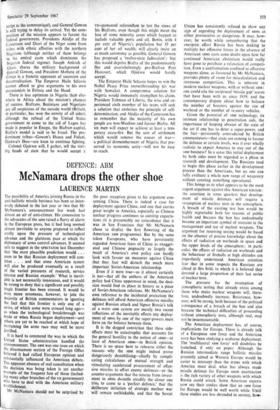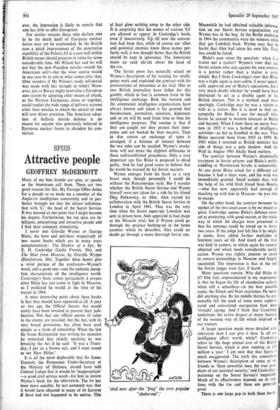McNamara drops the other shoe
DEFENCE: ABM LAURENCE MARTIN
The possibility of America joining Russia in the anti-ballistic missile business has been so inten- sively debated in the last year or two that Mr McNamara's announcement last week had almost an air of anti-climax. His concession to the advocates of the ABM raised a flurry of alarm in the European press, but it had long seemed almost inevitable to anyone prepared to reflect coolly upon the pressure of technological advance and the glutinous pace at which the diplomacy of arms control advances. It seemed safe to suggest in the SPECTATOR last December that 'the most plausible prediction would . . . seem to be that Russian deployment will con- tinue . . . and that some American system will also be produced eventually as a result of the varied pressures of research, service interest and Russian example.' What is inevit- able is not necessarily innocuous, and it would be wrong to deny that a significant and possibly tragic frontier has been crossed. It would be even more erroneous, however, to join the majority of British commentators in ignoring the fact that this frontier is only one of a series, of which some were crossed long ago— as when the technological breakthrough was made or when Russia began deployment—and others are yet to be reached at which hope of restraining the arms race may well be more justified.
It is hard to commend the way in which the United States administration handled the announcement. The ABM was one issue on which the disarmament section of the Foreign Office believed it had rallied European opinion and substantially influenced the American debate. The apparent absence of real consultation when the decision was being taken is yet another example of the frequent fate of those (includ- ing many other branches of the us government) who have to deal with the American military establishment. Mr McNamara should not be surprised by the poor reception given to his argument con- cerning China. There is indeed a case for deployment against China, and one that carries great weight in America, especially as Chinese nuclear progress continues to outstrip expecta- tions (it is presumably no coincidence that it was in San Francisco that Mr McNamara chose to display the first flowering of the American Alm programme). But by the same token Europeans, who have persistently regarded American fears of China as exagger- ated and Chinese pugnacity as largely the result of America's own policy can hardly look with favour on measures against China that they fear will disturb the much more important Soviet-American relationship.
Even if it were true—as it almost certainly is not—that all the authors of the American policy had China uppermost in mind, the deci- sion would find its place in history as a piece of Soviet-American relations. Mr McNamara's own reference to the incidental protection the defences will afford American offensive missiles against Russian attack and Signor Brosio's talk of a NATO ABM system are merely two recent reflections of the inevitable effects any deploy- ment of ABMS by one of the super-powers must have on the balance between them.
It is the dogged conviction that these side- effects must be catastrophic that accounts for the general hostility to the notion of ABMs—at least of American ABMs—in British opinion. There is no space here to rehearse either the reasons why the ABM might indeed prove dangerously destabilising—chiefly by compli- cating calculations of mutual strength and stimulating accelerated procurement of offen- sive missiles to offset enemy defences—or the counter-arguments that the returns from invest- ment in ABMS dwindle steadily the closer one tries to come to a 'perfect defence.' that the deliberate initiation of strategic nuclear war will remain unthinkable, and that the Soviet Union has consistently refused to show any sign of regarding the deployment of ABMS as either provocative or dangerous. It may, how-
ever, be worth while remembering that the energetic effort Russia has been making to
multiply her offensive forces in the absence of American Aims casts some doubt upon how far continued American abstention would really
have gone to purchase a relaxation of competi- tion. Even a confrontation confined to offensive weapons alone, as favoured by Mr McNamara, provides plenty of room for miscalculation and
strenuous competition. This is inherent in modern nuclear weapons, with or without ABM: one could cite the reciprocal 'missile gap' scares that have been with us since 1959, and the contemporary dispute about how to balance the number of boosters against the size of warhead or the number of re-entry vehicles.
Given the potential of ABM technology, its intimate relationship to penetration aids, the importance of keeping abreast of the state of the art if one has to deter a super-power, and the fact—persistently contradicted by British
commentators—that costs are coming to favour the defence at certain levels, was it ever wholly realistic to expect America to stay out of the ABM business? In a sense this initial deployment by both sides must be regarded as a phase in research and development. The Russians tend to begin this phase earlier in the development process than the Americans, but no one can fully evaluate a whole new range of weaponry without creating something operational.
This brings us to what appears to be the most cogent argument against this American tension:
the assertion in some quarters that develop- ment of missile detences will require a resumption of nuclear tests in the atmosphere.
A breach of the existing test ban would be highly regrettable both for reasons of public
health and because the ban has undoubtedly
become an important symbol of restraint in the management and use of nuclear weapons. The argument for renewing testing would be based
on the absence of precise knowledge about the effects of radiation on warheads in space and
the upper levels of the atmosphere: in parti- cular, the effects of radiation on warheads and the behaviour of fireballs at high altitudes are imperfectly understood. American scientists fear that in some respects the Russians are ahead in this field, to which it is believed they devoted a large proportion of their last series of nuclear tests.
The pressure for the resumption of atmospheric testing that already exists among those who make nuclear weapons will, there- fore, undoubtedly increase. Resistance, how- ever, will be strong, both because of the political consequence of a breach of the ban and also because the technical difficulties of proceeding without atmospheric tests, although real, may not be insurmountable.
The American deployment has, of course, implications for Europe. There is already talk
of a European ABM force and the American navy has been studying a seaborne deployment. The 'multilateral ABM force' will doubtless be launched, if only on paper. Although the Russian intermediate range ballistic missiles presently aimed at Western Europe would be easier to intercept than the tams with which America must deal, what has always made missile defence for Europe seem unattractive
is the rich variety of other weapons with which Russia could attack. Some American experts now say their studies show that an ARM force
for Europe would be well worth while. Until these studies are less shrouded in secrecy, how- ever, the impression is likely to remain that ABM has little to offer Europeans. For similar reasons those who declare ABM to be the death knell of European nuclear forces may yet be confounded. In the British case a quick improvement of the penetrative capability of the Polaris A3 at a cost well within British means should preserve its value for some considerable time. Mr Wilson has said we will not buy the new Poseidon missile—would the Americans sell?—but the wiser course would in any case be to aim at what comes after that. (One wonders if Mr Wilson's ready self-denial was made with this thought in mind.) More- over, just as Russia might neutralise a European ABM system by adopting other means of attack, so the Western Europeans, alone or together, could exploit the wide range of delivery systems other than missiles to which the advent of ABM will now direct attention. The American adop- tion of ballistic missile defence is no reason for anyone who previously believed in European nuclear forces to abandon his con- viction.







































 Previous page
Previous page